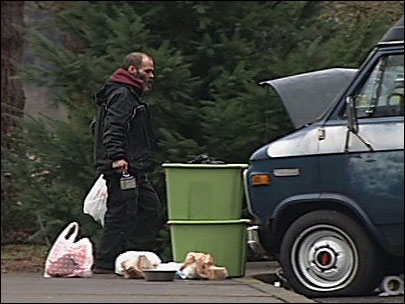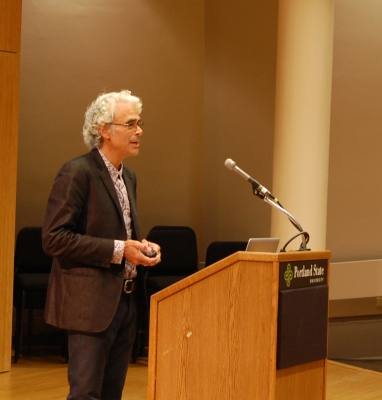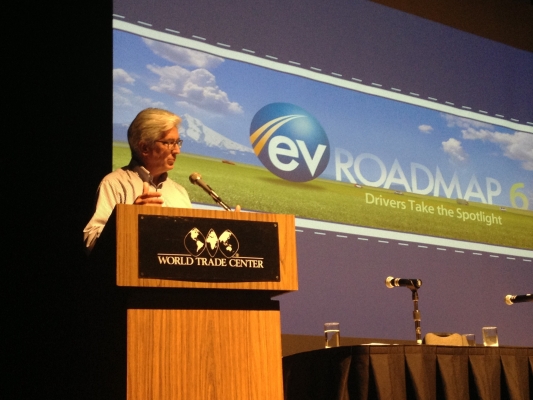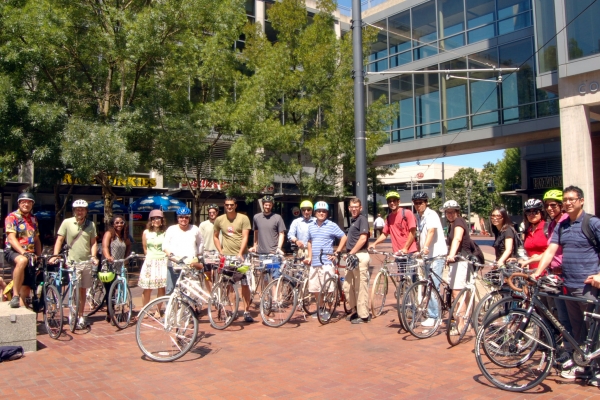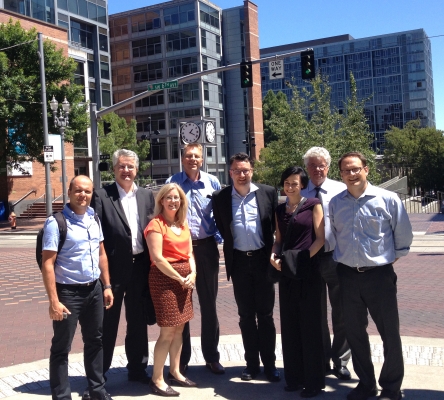At age 8, Taras Grescoe decided that his Vancouver, B.C., residential street had too many cars chugging past. So he removed them.
“I completely redesigned our city block and modeled with Monopoly hotels what it would look like without cars,” Grescoe said. “I was this 8-year-old urban planning geek in the making.”
While his career took a different path, those early transportation experiences shaped a worldview Grescoe outlines in his latest book, “Straphanger.” Grescoe will present his observations as the keynote speaker for the Oregon Transportation Summit Sept. 16.
Register for the summit through the following link:
https://trec.pdx.edu/OTRECUS/events/subpage/OTS/page1
The author of nonfiction essays and books including “Bottomfeeder: How to Eat Ethically in a World of Vanishing Seafood” Grescoe is a frequent contributor to the New York Times, the Independent and National Geographic Traveler and has written for Gourmet, Salon and Wired.
If moving from a...
An OTREC project recently took an in-depth look at the travel-time and health-related effects of a new implementation of a state of the art adaptive traffic system.
Southeast Powell Boulevard is a multimodal urban corridor connecting highway US-26 through Portland, Oregon. The corridor is highly congested during morning and evening peak traffic hours. In October 2011, an adaptive traffic system called SCATS was deployed.
The primary function of SCATS, or Sydney Coordinated Adaptive Traffic System, is to mitigate traffic congestion. Using sensors (usually inductive loops) at each traffic signal, the system tries to find the best cycle time and phasing along the corridor as traffic demand patterns change.
In this integrated multimodal study, OTREC researchers looked at the corridor’s traffic speed and transit reliability, before and after the implementation of SCATS. In addition, a novel contribution of this study was to study the link between signal timing and air quality.
To determine the impact of SCATS on traffic and transit performance, researchers established and measured performance measures before and after SCATS. The researchers used data provided by TriMet, Portland's transit authority, to compare transit times before and after SCATS as well as traffic volume data from two Wavetronix units that were installed by the City of Portland; these units collect traffic counts, speeds and classifications. For the air quality study, TriMet also...
Read more(First published by BikePortland.org)
Portland has a network of neighborhood greenways, and they're great. But Jean-Francois Pronovost's is 3,100 miles long. That's approximately the distance from Portland to Nicaragua.
The Greenway (Route Verte in Pronovost's native French) is a bike route network running all over the Canadian province of Quebec. On Monday, the vice president for development and public affairs at advocacy group Vélo Québec visits Portland to share lessons from this project and others in the first annual Ann Niles Transportation Lecture, a major new series produced by Portland State University's Institute for Bicycle and Pedestrian Innovation.
The event is free, though space is limited to 240. On Thursday, BikePortland spoke with Pronovost to learn more about his life's work, the best parts of Quebec bike touring and how his hometown of Montreal managed to replace 320 auto parking spaces with a downtown protected lane that carries 9,000 bikes per day. Questions and answers were edited for space.
Can you describe your most famous achievement, the Route Verte??
The Route Verte [pronounced with hard Ts...
Read moreJohn MacArthur, OTREC’s Sustainable Transportation Program Manager, was a panel moderator at this year's EVRoadmap 6 workshop.
The EV Roadmap workshop series has established itself as the Pacific Northwest’s premier electric vehicle gathering, with a goal of increasing the visibility and understanding of electric vehicles.
Co-sponsored by Portland General Electric and Portland State University, the event supports the shared goal of building a stronger, more sustainable transportation landscape.
The sixth annual EV Roadmap workshop, "Drivers Take the Spotlight," was a continuation of this fruitful partnership. The event was held at the World Trade Center in Portland on July 30-31, 2013. MacArthur moderated a panel titled "Not All Drivers Need Four Wheels." This panel focused on odd-sized electric vehicles such as e-bikes.
E-bikes are a specialty of MacArthur's; he has conducted several research studies about people's use and perceptions of the electric-assisted bicycle. His project "Evaluation of Electric Bike Use in Portland Metro Region" (click here for more information about that project, or to download the final report) focused on exploring the potential new market segments for e-bikes and the economic, operational, safety, and...
Read moreIBPI, or the Initiative for Bicycle and Pedestrian Innovation, is a center for research and learning that is focused on bicycle and pedestrian travel.
Based at Portland State University, the group's aim is to advance bicycling and walking as integral elements of the transportation system in Oregon’s communities. July 24 -26 IBPI hosted a faculty workshop to help transportation professors integrate bicycle and pedestrian topics into their courses.
Aimed at faculty members teaching transportation courses within an accredited planning or engineering program at the university level, the workshop included curriculum, guidebooks, and field trips to gain first-hand knowledge of bicycle and pedestrian facilities in Portland, Oregon.
It was kept small, to allow for discussion and interaction. The workshop's 15 participants were first given the chance to describe the existing gaps in their courses and what they hoped to gain from the workshop, then guided through a two-day series of activities tailor-made to fit their needs.
Their goals ranged from specific to general, requesting ways to incorporate GIS analysis into bicycle and pedestrian courses, suggestions for how to integrate active travel performance measures with typical vehicular performance measures, and generally a deeper understanding of bicycle research.
Robert Bertini (Portland...
Read moreOTREC had visitors on Wednesday, July 24.
A delegation of six ECTRI directors from Austria, the Czech Republic, Germany, Norway, and Finland are finishing up a "Scanning Tour" of the United States, and OTREC was the third stop on their four-stop tour.
The European Conference of Transport Research Institutes, or ECTRI, is an international non-profit organization. Its members are 26 major transport research institutes or universities from 19 European countries, and its mission is to help build the "European Research Area" (ERA) in transport.
The 2013 Scanning Tour's theme is "Transport and Liveability: Sustainabiity of urban areas." Assisted by the Transportation Research Board, ECTRI made four stops in the USA: Washington, D.C., to participate in the TRB conference; Cambridge and Boston, Mass. for a visit to Volpe and to MIT's freight lab; Portland, Ore., to talk with Jennifer Dill and John MacArthur about OTREC's sustainable transportation program; and finally Davis, Calif., to visit the Institute of Transportation Studies at UC Davis.
Wednesday's visit was brief and pleasant. OTREC staff gave the delegation a presentation about the work that OTREC does and its sustainable cities initiative, followed by questions...
Read more
